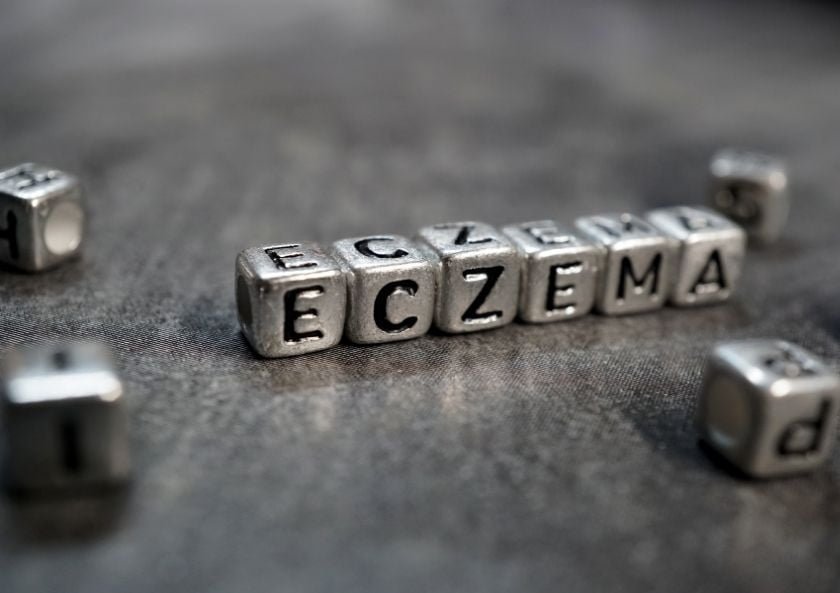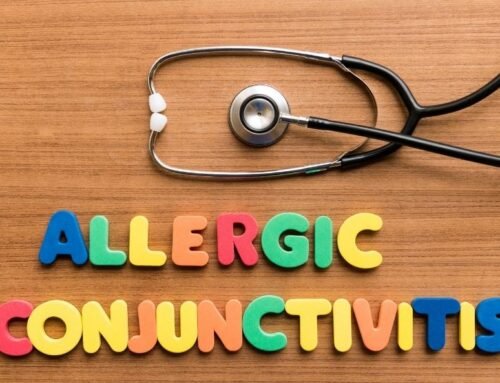Eczema (Atopic Dermatitis) is a chronic skin disease that usually occurs during infancy, progressing with itching and exacerbation. Eczema (atopic dermatitis) occurs in children and infants by the interaction of genetics (heredity) and environmental factors. About 50-75% of children with eczema have an allergen sensitivity, the most common one is food. In most children, eczema improves at a later age.
What is Eczema (Atopic Dermatitis) in Children?
Eczema is the most common skin disease of childhood, which occasionally starts with exacerbations and improvements, with signs of dryness, itching and rashes on the skin.
What is the incidence of eczema (atopic dermatitis)?
The frequency of eczema has increased in recent years as in other allergic diseases, reaching 15-20% in developed countries. But its frequency varies from country to country. In our country, its frequency varies between 2-10% in children.
What is the Age of Eczema (Atopic Dermatitis) to Be Seen in Children?
Findings start in the first 6 months in 45% of children with eczema, in the first age in 60% and under the age of 5 in 85%. Eczema is a childhood disease.
What are the Causes of Eczema (Atopic Dermatitis) in Children?
Eczema is a complex genetic disease caused by interactions between the gene and the environment. Genetic predisposition is the leading cause of eczema. Children with an allergic disease such as asthma, allergic rhinitis, and eczema in their mother, father or sibling are more likely to experience eczema (atopic dermatitis). While the incidence of eczema is 77% in identical twins, it is 15% in nonidentical twins. The risk of developing an allergic disease in children with an allergic disease in their mother or father is between 30% and 50%.
As a result of the changes in the skin structure resulting from various genetic disorders in eczema, the water and oil retention function of the skin is impaired and disease findings are observed.
What are the environmental factors that play role in the development of eczema (Atopic dermatitis)?
Food allergies play an important role in the development of eczema.
Various environmental allergens play a role in the emergence of eczema. Food allergies come first in these. The role of food allergies is especially important in childhood. In 30-40% of children with eczema, the cause is food allergy. Milk and eggs are at the top of these foods. Animals, mite and pollen allergies also play a role in the development of eczema.
Apart from these, various factors such as stress, climate, clothing, soaps and detergents used, and infections play a role in the emergence of eczema.
What are the symptoms of eczema (Atopic dermatitis)?
The most important symptom of eczema is itching. The rash that starts on the cheeks, behind the neck and ear then appears on the trunk and joints. Dry skin is an important finding.
What Should You Do If Your Child Has Symptoms of Eczema (Atopic Dermatitis)?
If there are symptoms of eczema, a Pediatric Allergy specialist should be visited.
If your child has symptoms of eczema, you should definitely consult a pediatric allergist, the most experienced doctors. Because it is necessary to make the correct diagnosis by making the necessary examination and tests as soon as possible. Thus, if eczema has an environmental cause, it is ensured that necessary treatments are started.
How to prepare when going to the doctor for eczema (Atopic dermatitis)?
When going to a pediatric allergist for the symptoms of eczema, all previous tests should be brought. Both a faster evaluation can be made and unnecessary repetition of the same tests are prevented. If possible, allergy medications, cough syrups and cold medicines should be discontinued 1 week ago, as they affect the allergy tests made on the skin.
How is Eczema (Atopic Dermatitis) Diagnosed in Children?
The diagnosis of eczema is made on the basis of the information and examination findings about the child and his family. There is no specific diagnostic laboratory test. However, some tests should be done for the detection of allergens and also for differential diagnosis.
Allergy testing is important in diagnosing eczema (atopic dermatitis).
Although eczema diagnosis is not based on allergy tests, it is very important. Because cause 30-40% of eczema in babies is food allergy. To find the cause of a food allergy, an allergy test is done for foods. Allergy test on skin can be done from 1-2 months of age. “Allergy test on the skin can not be made before the age of three” information is wrong. Allergy test on the skin, which is preferred after the age of 3, is for respiratory allergens, asthma and allergic rhinitis.
How should eczema (Atopic dermatitis) be treated in children?
The importance of Pediatric Allergist in eczema treatment
Eczema is the first allergic disease of childhood. Other allergic diseases are more likely to occur together or later. For this reason in diagnosis, monitoring and treatment, it is very important to be followed by the most trained and experienced child allergy specialists.
There is no treatment method to completely eliminate eczema. The goals of the treatment are to eliminate the environmental factors that cause the complaints to flare up, to suppress the complaints, to moisten the skin and to reduce eczema in the skin.
Environmental factors that cause exacerbation of eczema (Atopic dermatitis) should be avoided.
Environmental factors are effective in exacerbation of the disease. Therefore, various measures should be taken. Food, mite, animal and pollen allergens that cause complaints should be avoided. Sweating should be prevented.
Bath in Eczema Treatment
One of the mistakes encountered in the treatment of eczema is that children with eczema should take a little bath. Daily baths make the skin moisturized, and since children with eczema have more germs on their skin, on the contrary, frequent bathing leads to the removal of those germs. However, products that do not dry and irritate the skin should be selected while taking a bath.
Moisturizers in Eczema Treatment
The most important thing to do in the treatment of eczema is moisturizing the skin. Because the skin barrier is damaged in eczema. Skin can’t hold moisture. The barrier disorder in this skin should be cured. Suitable moisturizers should be applied to the whole body regularly. Applying moisturizers is more effective when the body is moist after the bath. Moisturizers can be used 2-4 times a day, depending on the condition of the patient.
Clothing in Eczema Treatment
Tight clothes such as woolen and synthetic fabrics and tights should not be worn by babies and children with eczema. Because woolen, synthetic and tight clothing may cause symptoms of eczema by causing sweating. Cotton or silk clothes should be preferred instead.
Laundry should be washed with liquid detergent or granular soaps instead of powder detergent and rinsed very well. Softening agents should not be used.
Drugs in Eczema Treatment in Children
Various drugs are used in the treatment of eczema. The most important of these drugs are drugs containing cortisone. These form the basis of eczema treatment. They are the most effective drugs that prevent exacerbation of eczema. But there is a fear in the families against cortisone. Creams containing cortisone should be applied only to the areas with eczema twice a day. Weaker cortisone should be applied to the face and folds where the skin is thinner and the period should not exceed 7-10 days. If these rules are followed, they do not cause side effects.
In recent years, new drugs that do not contain cortisone, effective in the treatment of eczema, have been introduced. Pimecrolimus is one of these substances in our country but it is used after 2 years of age.
However, although Crisaborole and dupilumab are used abroad, they are not available in our country.
Allergy pills and syrups containing antihistamines are used for itching, but their effects are very weak. They can be useful in preventing night itching.
Antibiotics should only be used to treat skin infections. Apart from this, they have no place in treatment.
Vaccine therapy in eczema treatment (immunotherapy)
Vaccine (immunotherapy) treatment is not used in the treatment of eczema. However, if children older than 5 years old have diseases such as house dust mite allergy and asthma, allergic flu, allergy vaccine treatment can be done against house dust mites. In this case, eczema symptoms may also regress.
Does eczema last for life, will it improve over time?
There is no treatment that will completely improve the eczema for today. But it is a disease that can be passed spontaneously. About 75% of children with eczema recover before puberty. However, it is important to monitor patients for asthma and allergic rhinitis that may develop in the future.
As a result;
- Eczema (Atopic dermatitis) is the most common allergic skin disease in children.
- Genetic predisposition is the leading cause of eczema (Atopic dermatitis).
- Various environmental factors, especially food allergy, play a role in other causes of eczema.
- When symptoms of eczema are seen, it will be beneficial to go to a Pediatric Allergy specialist for proper diagnosis and treatment and follow-up.
- Allergy syrups, cough syrups and cold medicines should be discontinued 1 week before the child goes to the allergist, as an allergy test may be required. Even using one dose affects the test.
- The diagnosis of eczema is made with information about the child and family, with the findings of the examination.
- Allergy testing is important in eczema diagnosis and skin allergy testing can be done from 1-2 months of age.
- Trained and experienced specialists in the diagnosis and treatment of eczema in infants and children are Pediatric Allergy specialists.
- Although there is no cure to completely eliminate eczema, all measures and medications can keep the symptoms of the disease under control.
- About 75% of children with eczema recover before puberty.






